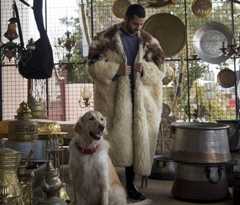Goat and sheep plague threatens Greek meat industry
Posted on byKarin Kloosterman inAnimalsAnoyster plague in oysters and now there is a worrying plague that has started in Greece, worrying farmers about their livestock. A goat plague, also known as Peste des Petits Ruminants, was detected for the first time in Greece last month. While the virus does not seem to infect humans, it is highly contagious among goats and sheep and can kill between 80 and 100% of those infected.
To combat the spread of the plague first found in the 1942, Greece has banned the movement of goats and sheep around the country, made up of a mainland and about 6,000 smaller islands. Greece also shares a 150 mile border with Turkey –– also a lover of goat and sheep meat.
“The movement of sheep and goats for breeding, fattening and slaughter is banned throughout Greece,” said Greece’s agriculture minister Costas Tsiaras said.

Iranians love sheep meat and the special fat found in the tail of their special breed.
New infections are active in the central Larissa region and in Corinth in the south.
The ban had been introduced “with the aim of limiting the spread and eradication of the disease”.
The ministry also said an investigation was under way to determine the source of the plague, and it may be from imported meat.
If a case is found an entire group of livestock from the farm must be killed. Since July 11, about 7,000 animals have already been culled according to the BBC.
Greece is a goat loving country and has the highest number of goats in Europe. The milk from Goat and sheep is used to make feta cheese – a trademark Greek product.

Adrian Pepe makes art from Lebanese sheep skin
Goats are also loved by Muslims.Read our story about a family’s goat slaughter for Eid.
PPR was first reported in Ivory Coast in 1942 and has since spread globally.
There are some very good arguments for Slow Food and eating food grown from smallhold farms,regenerative farms and which are grown locally. Globalism has created an influx of invasive pests. These diseases and insects are kicking down forests in Canada, they are infecting lakes and seas (jellyfish andzebra mussels) and they are affecting our meat and milk.
Looking for solutions?These farmers define animal farming and food in new old ways. Click here.
Author:Karin Kloosterman
Karin Kloosterman is an award-winning journalist and publisher that founded Green Prophet to unite a prosperous Middle East. She shows through her work that positive, inspiring dialogue creates action that impacts people, business and planet. She has published in thought-leading newspapers and magazines globally, owns an IoT tech chip patent, and is part of teams that build world-changing products to make agriculture and our planet more sustainable. Reach out directly to[email protected]
About Karin Kloosterman
Karin Kloosterman is an award-winning journalist and publisher that founded Green Prophet to unite a prosperous Middle East. She shows through her work that positive, inspiring dialogue creates action that impacts people, business and planet. She has published in thought-leading newspapers and magazines globally, owns an IoT tech chip patent, and is part of teams that build world-changing products to make agriculture and our planet more sustainable.Reach out directly to[email protected]













